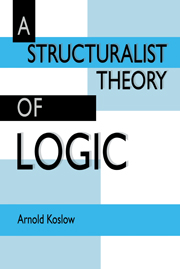Book contents
- Frontmatter
- Contents
- Preface
- Part I Background
- Part II Implication relations
- Part III The logical operators
- 11 Hypotheticals
- 12 Negations
- 13 Conjunctions
- 14 The disjunction operator
- 15 The logical operators parameterized
- 16 Further features of the operators
- 17 The dual of negation: Classical and nonclassical implication structures
- 18 The distinctness and relative power of the logical operators
- 19 Extensionality
- 20 Quantification
- 21 Identity
- 22 Special structures I: Logical operators on individuals: Mereology reconstituted
- 23 Special structures II: Interrogatives and implication relations
- 24 Completeness
- Part IV The modal operators
- Appendix A An implication relation for the integers in the programming language BASIC
- Appendix B Symmetric sequents as products of implication relations and their duals
- Appendix C Component-style logical operators and relevance
- Notes
- Bibliography
- Index
- Frontmatter
- Contents
- Preface
- Part I Background
- Part II Implication relations
- Part III The logical operators
- 11 Hypotheticals
- 12 Negations
- 13 Conjunctions
- 14 The disjunction operator
- 15 The logical operators parameterized
- 16 Further features of the operators
- 17 The dual of negation: Classical and nonclassical implication structures
- 18 The distinctness and relative power of the logical operators
- 19 Extensionality
- 20 Quantification
- 21 Identity
- 22 Special structures I: Logical operators on individuals: Mereology reconstituted
- 23 Special structures II: Interrogatives and implication relations
- 24 Completeness
- Part IV The modal operators
- Appendix A An implication relation for the integers in the programming language BASIC
- Appendix B Symmetric sequents as products of implication relations and their duals
- Appendix C Component-style logical operators and relevance
- Notes
- Bibliography
- Index
Summary
Quantification, universal or existential, concerns operators that act on implication structures. More precisely, they act on the predicates of what we shall call extended implication structures, as well as the members of what we have called implication structures. In order to see how these operators can be characterized as logical operators, we need first to introduce a somewhat more complex kind of implication structure than the kind we have employed thus far.
Extended implication structures
The extended implication structures are like the implication structures considered thus far, with two additions: (1) a set E of “objects,” or “entities” (possibly empty), and (2) a set Pr (possibly empty) of special kinds of functions that we shall call “predicates.” We shall indicate an extended implication structure by I = 〈E, Pr, S, ⇒〉, where S is a nonempty set and “⇒” is an implication relation on S.
We think of a predicate P of the extended structure as a function that maps the infinite sequences of the set E to the set S. Thus, we shall let E* be the set of all sequences (s1, s2, …), where the si belong to E, and a predicate P of the extended structure is a mapping of E* to S.
The idea of a predicate as a function on infinite sequences of objects may seem a bit strange, despite its central use in such classic studies as A. Tarski's work on truth and A. Mostowski's study of quantifiers.
- Type
- Chapter
- Information
- A Structuralist Theory of Logic , pp. 181 - 201Publisher: Cambridge University PressPrint publication year: 1992



